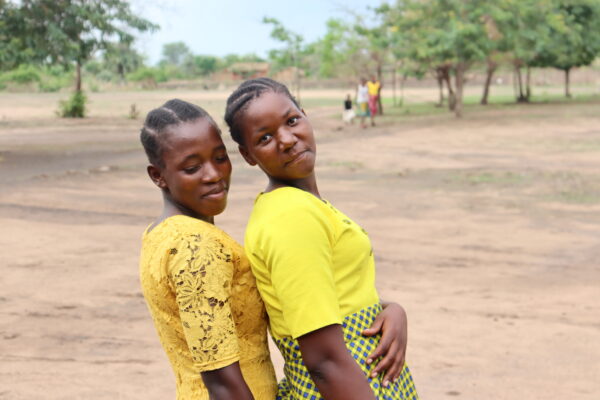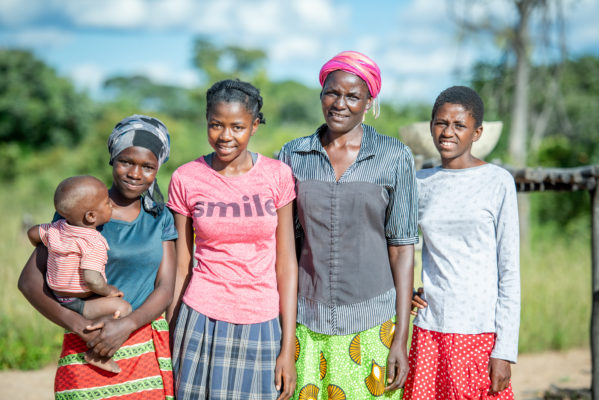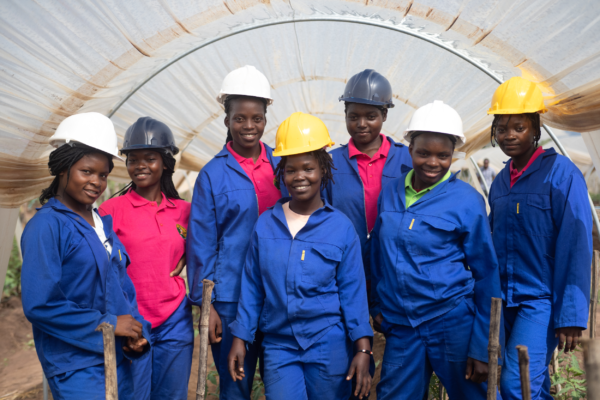Bantwana Resources for Women Deliver 2023
Welcome Women Deliver 2023 participants!
The theme of WD2023 is Spaces, Solidarity, and Solutions. Similar to this conference, the Bantwana Initiative also works to “create spaces that foster solidarity for sustainable solutions on gender equality.” More specifically, Bantwana works with governments, local organizations, and communities in sub-Saharan Africa to strengthen comprehensive health, education, social protection, and economic resilience supports that improve the wellbeing of children and families affected by HIV/AIDS, poverty, violence, and harmful norms. Centering the inherent dignity, agency, and rights of girls and women is a core principle in fulfilling Bantwana’s mission to holistically address the needs of communities deeply affected by HIV, poverty, and violence.
SPACES
 Throughout our programming, Bantwana fosters safe spaces for adolescent girls and young women to come together and connect on shared experiences. Under the DREAMS program in Zimbabwe, implemented by local affiliate Bantwana Zimbabwe, Safe Spaces are formed at the community level to engage young women and facilitate conversation around HIV prevention, financial literacy, and skills building. DREAMS also provides Social Asset Building activities that help facilitate strong friendships and family-like bonds between girls who have faced similar challenges. These bonds are one of the many social assets essential to girls and young women’s well-being. This is just one example of the way in which Bantwana programs create physical spaces and safe environments for not only girls and young women, but boys and young men, families, and community leaders to come together to have important conversations around gender equality and harmful norms.
Throughout our programming, Bantwana fosters safe spaces for adolescent girls and young women to come together and connect on shared experiences. Under the DREAMS program in Zimbabwe, implemented by local affiliate Bantwana Zimbabwe, Safe Spaces are formed at the community level to engage young women and facilitate conversation around HIV prevention, financial literacy, and skills building. DREAMS also provides Social Asset Building activities that help facilitate strong friendships and family-like bonds between girls who have faced similar challenges. These bonds are one of the many social assets essential to girls and young women’s well-being. This is just one example of the way in which Bantwana programs create physical spaces and safe environments for not only girls and young women, but boys and young men, families, and community leaders to come together to have important conversations around gender equality and harmful norms.
SOLIDARITY
 One of the most important ways that Bantwana implements projects and strategies to improve the health, education, and well-being of girls and young women is by engaging with stakeholders at all levels — working in close partnership with national, regional, and local governments, local and civil society organizations, and community institutions and leaders. In order to foster sustainable solutions and break down harmful norms, all different members of the community must be involved the process. Under the ICYD Activity in Uganda, parenting, early childhood development, HIV and GBV prevention curricula and nutrition education involved caregivers and families to build knowledge and strengthen family coping skills to improve safety, stability, health, and learning for all children. Bantwana also recognizes the importance of involving boys and men, encouraging solidarity in the fight to end gender-based violence and promote positive gender norms. The latest annual report from the Western Uganda Bantwana Program indicated an improved agency of boys and girls to prevent and respond to violence and promote positive gender norms. According to this report, 30% more boys and girls in the program are capable of recognizing abuse and 10% more children believe that boys should treat girls with respect and dignity both in school and at home.
One of the most important ways that Bantwana implements projects and strategies to improve the health, education, and well-being of girls and young women is by engaging with stakeholders at all levels — working in close partnership with national, regional, and local governments, local and civil society organizations, and community institutions and leaders. In order to foster sustainable solutions and break down harmful norms, all different members of the community must be involved the process. Under the ICYD Activity in Uganda, parenting, early childhood development, HIV and GBV prevention curricula and nutrition education involved caregivers and families to build knowledge and strengthen family coping skills to improve safety, stability, health, and learning for all children. Bantwana also recognizes the importance of involving boys and men, encouraging solidarity in the fight to end gender-based violence and promote positive gender norms. The latest annual report from the Western Uganda Bantwana Program indicated an improved agency of boys and girls to prevent and respond to violence and promote positive gender norms. According to this report, 30% more boys and girls in the program are capable of recognizing abuse and 10% more children believe that boys should treat girls with respect and dignity both in school and at home.
SOLUTIONS
 Committed to advancing equitable health and socioeconomic outcomes, Bantwana seeks sustainable solutions to long-standing, systemic discrimination and barriers that constrain girls’ and women’s access to opportunity and full participation in civic life. Across all its programming, Bantwana aims to strengthen systems and support the capacity of local organizations and individuals to maximize impact for lasting change. Our partners include national and local governments, non-governmental organizations, community- and faith-based organizations, schools, clinical partners, and private sector institutions. Using assessment tools, coupled with a deep understanding of partners’ needs and open communication, we determine capacity gaps and agree with partners on technical assistance that will be most beneficial. The Bantwana Siyakha Girls Model is one of our many successful models that has yielded impactful results. Siyakha Girls is a comprehensive economic strengthening framework, initially designed and tested in Zimbabwe, for reaching vulnerable adolescent girls and young women (AGYW) aged 15 to 24 and setting them up for sustainable livelihoods. Due to the success of the pilot and wide acceptance of the model, we’re supporting local, USAID-funded implementing partners to scale up the model across 33 districts.
Committed to advancing equitable health and socioeconomic outcomes, Bantwana seeks sustainable solutions to long-standing, systemic discrimination and barriers that constrain girls’ and women’s access to opportunity and full participation in civic life. Across all its programming, Bantwana aims to strengthen systems and support the capacity of local organizations and individuals to maximize impact for lasting change. Our partners include national and local governments, non-governmental organizations, community- and faith-based organizations, schools, clinical partners, and private sector institutions. Using assessment tools, coupled with a deep understanding of partners’ needs and open communication, we determine capacity gaps and agree with partners on technical assistance that will be most beneficial. The Bantwana Siyakha Girls Model is one of our many successful models that has yielded impactful results. Siyakha Girls is a comprehensive economic strengthening framework, initially designed and tested in Zimbabwe, for reaching vulnerable adolescent girls and young women (AGYW) aged 15 to 24 and setting them up for sustainable livelihoods. Due to the success of the pilot and wide acceptance of the model, we’re supporting local, USAID-funded implementing partners to scale up the model across 33 districts.
Our gender-focused project examples and resources include:
DREAMS Programming Experience:
- DREAMS Core – Eswatini
- Ana Patsogolo Activity (APA) – Malawi
- DREAMS Initiative – Mozambique
- DREAMS Innovation Challenge – Tanzania
- DREAMS Project – Zimbabwe
Malawi APA Project Technical Briefs:
- APA DREAMS Program Brief
- Early Childhood Stimulation Interventions for HIV Positive Mothers Reduce Mother-to-Child
- Improving HIV Outcomes for Children and Adolescents
Malawi: Essential Gender-Based Violence Services and Prevention
Uganda: Integrated Children and Youth Activity (ICYD); ICYD Root Cause Analysis Brief
Mozambique: Technical Assistance and Capacity Development
Zambia: Piloting the Case Management System for Keeping Girls in School
Tanzania: Waache Wasome “Let Them Learn”; Together to End Violence Against Women
Explore our website further to learn about our full breadth of projects and interventions.
